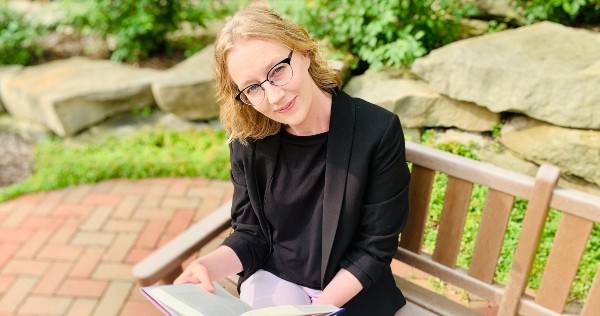In a time when the descriptors “evangelical” and even “Christian” are taking on destructive meanings they have not heretofore known in America, we need wise guides who can help us unravel the political from the theological, who can help us understand the toxic elements of religious practice that have led to this riven America.
Calvin College historian Kristin du Mez, best-selling author of Jesus and John Wayne: How White Evangelicals Corrupted a Faith and Fractured a Nation, is one of the foremost of these commentators on how Christian nationalism and toxic Christian masculinity have become so destructive in and to our culture. I interviewed Kristin prior to her appearance at Baylor University this week at the Racism in the White Church conference, where she will join wise guides Robert P. Jones and Beth Barr in confronting what has gone wrong with American Christianity and how trends in some parts of American Christianity have aggravated rather than led to healing of America’s racial divide.
Kristin, you’re going to be talking at Baylor about what your findings suggest about race and American evangelicalism. How does this current inclination of the church you study contribute to racism in the church, and how does it result in racism in our culture?
One of the things I came to understand through my research was how much white evangelical notions of what is “biblical” — of what is Christian — are shaped by their own cultural and political identities. Evangelicals will claim the Bible shapes their identity and their politics, but history demonstrates there is always an interplay between culture and belief.
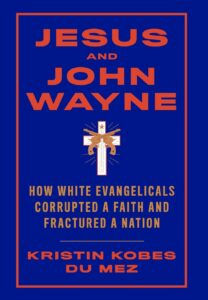 In the case of Jesus and John Wayne, I thought I was writing a book about masculinity, but very quickly I came to realize I also was writing a book about race. For example, I noticed early on that although books on Christian manhood in the 2000s rarely talked about race in any explicit way, the heroes they celebrated were all white men. Frequently, their heroes were white men like Teddy Roosevelt and John Wayne — men who proved their heroism by subduing nonwhite populations (onscreen or off), often through violence. Men who were not white were not held up as heroic ideals. Instead, nonwhite men (Arab men, Mexican immigrants) frequently were depicted as threats. I traced this back through history and understood how both the Civil Rights Movement and the Vietnam War both contributed to this racialized understanding of “Christian” masculinity.
In the case of Jesus and John Wayne, I thought I was writing a book about masculinity, but very quickly I came to realize I also was writing a book about race. For example, I noticed early on that although books on Christian manhood in the 2000s rarely talked about race in any explicit way, the heroes they celebrated were all white men. Frequently, their heroes were white men like Teddy Roosevelt and John Wayne — men who proved their heroism by subduing nonwhite populations (onscreen or off), often through violence. Men who were not white were not held up as heroic ideals. Instead, nonwhite men (Arab men, Mexican immigrants) frequently were depicted as threats. I traced this back through history and understood how both the Civil Rights Movement and the Vietnam War both contributed to this racialized understanding of “Christian” masculinity.
But what makes this conversation so difficult in white evangelical spaces is that white evangelicals have embraced the (very white) notion of “colorblindness,” and thus many find it deeply offensive to encounter arguments that suggest that their understanding of what is good and true in fact reflects their racial identity.
What this all means is that racism is often invisible to white evangelicals, and attempts to show white evangelicals how their communities end up promoting racist policies and perpetuating racial stereotypes is often met with fierce resistance. More often than not, it ends up reinforcing an evangelical sense of embattlement, and thus reinforcing the racism at the heart of that embattled identity.
What are some hopeful things the church might do (or is doing) to move forward from militant masculinity and misinterpretation of Scripture? How might that movement shape how American Christianity deals with issues like institutional racism and immigration?
First, it’s important to point out that “the church” is much bigger than white evangelicalism. So, large portions of “the church” don’t need to move on from militant masculinity or racism. In fact, white evangelicals would do well to look for places outside of white evangelicalism where Christianity is flourishing.
“It’s important to point out that ‘the church’ is much bigger than white evangelicalism. So, large portions of ‘the church don’t need to move on from militant masculinity or racism.”
Many white evangelicals have centered white evangelicalism for so long — it is simply God’s truth — that it can be hard to remember that the shortcomings of white evangelicals are just that, shortcomings of white evangelicals and not necessarily the church writ large.
For evangelicals engaging in some sort of “deconstruction,” this can be important to recognize. But I think that the church as a whole — and certainly white evangelicalism — would be strengthened by focusing less on erecting walls and more on listening across differences. The gospel is always enculturated. No one group has a perfect grasp on God’s truth. So we should always be working to learn from those who are different from us, who read the Scriptures in different ways, who are attentive to things we may neglect or dismiss.
To me, this is part of what it means to be part of the larger body of Christ. It requires humility, but it is also a source of great joy. In the United States, however, it takes intentionality to connect with believers who are different. Our history of segregation has shaped our neighborhoods, our schools and our denominations, so we need to make an effort to dismantle these boundaries and position ourselves in places where we can hear from voices different than our own.
I know you are very much engaged with friends and foes (my facile snap characterization of your social media interactions). Would you feel comfortable talking a bit about or characterizing the most painful exchanges you’ve had with people pushing back on your conclusions? Have you felt endangered? Diminished? And what are the most lifegiving things that have grown out of your engagements with others or the publication of your books?
I’m wired in such a way that I generally really enjoy lively debate. As a historian who has, until now, written about people who are not living, it’s pretty fun to be able to interact with some of the people I’ve written about. That said, I do find it frustrating that some “foes” — certain conservative evangelical men, for example — are either unwilling or unable to interact with my book as a work of history.
I’ve written so many threads explaining how historians do our research, how our work is not “objective” but how we do follow rules of evidence and argument, how we build on the peer-reviewed scholarship of other historians, and how my historical methodology means I am asking some questions and not others, and drawing certain conclusions that cannot and should not be reduced to theological pronouncements. At this point, I’m not sure it makes sense to keep rehashing all of this, as much as I do love discussing historiography and methods. Mostly, I’ve been curious about whether certain evangelical leaders are in fact incapable of understanding the discipline of history because of their own narrow academic training, or if they are simply trying to discredit my work using any means necessary. I really don’t know.
“I engage certain critics not because I want to convince them I’m right, but in order to make visible to people inside and outside their spaces what’s really going on and what’s at stake.”
Over the past one and half years, I have received a few messages that make me uneasy, and I have taken some proactive measures to protect myself and my family. I have pushed back when certain conservative evangelical men have repeatedly tarred me as a “wolf,” suggested that I’m walking with the devil, and the like.
As a historian I know that words have meaning, and that demonizing and dehumanizing opponents can lead to unintended consequences. And so I take this language very seriously. I have publicly called out those who do so, and they have refused to back down from it. Have I felt diminished? No. My identity doesn’t depend on the approval of these guys. Thankfully, as a historian I have academic peers, and I care what they think of my scholarship.
I engage certain critics not because I want to convince them I’m right, but in order to make visible to people inside and outside their spaces what’s really going on and what’s at stake.
Also, it’s worth noting that for every negative interaction I get, I receive hundreds of messages of thanks and affirmation. These sustain me.
And so I do want to acknowledge the pushback — and some of it gets ugly — but each and every day I receive several beautiful, life-giving messages from readers. For what it’s worth, many of these come from conservative white evangelical men. Many also come from survivors. Honestly, the people I’ve connected with through this book have been incredibly inspiring to me.
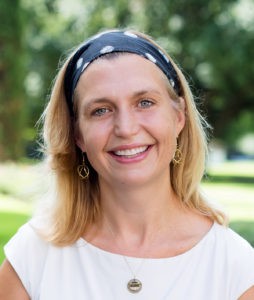
Beth Allison Barr
I know that you and my Baylor colleague Beth Barr (author of The Making of Biblical Womanhood: How the Subjugation of Women Became Gospel Truth) are friends, and certainly you are exploring similar tensions in American Christianity. How did you meet, how did your friendship grow, and what is your favorite thing about each other and who you are with each other?
We first met in person after Beth invited me to speak at Baylor because she’d discovered my first book on the history of Christian feminism, and she was organizing an event on the history of female biblical interpreters, if I remember correctly. We also both were members of the Conference on Faith and History (Beth is now president of that organization), and then Beth invited me to blog with her at the Anxious Bench.
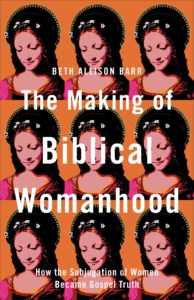 We’ve actually only met in person a handful of times, but early on we recognized that we shared a lot in common — as Christian women, as academics, as moms, as Christian historians who care about the church and who care about our fellow Christian women.
We’ve actually only met in person a handful of times, but early on we recognized that we shared a lot in common — as Christian women, as academics, as moms, as Christian historians who care about the church and who care about our fellow Christian women.
But we are also quite different. We come from different faith traditions, our areas of expertise are very different (I know next to nothing about Medieval women’s history, except what I’ve learned from reading Beth’s book), and the books we’ve written — while both disrupting evangelicalism — are different in tone, style and substance. I think our personalities are somewhat different as well.
I love all these differences, because it shows how you don’t have to follow one pattern to be a Christian woman in academics making a difference. Each of us can follow our own path and do our own work, and then we can find one another and work in tandem, support each other and cheer each other on. That’s the fun part.
Honestly, Beth and I can talk for hours about pretty much anything. One thing we could reflect on is how our lives have changed in the time since our books have been published, the things we’ve learned, the things we struggle with and the choices we’re making moving forward.
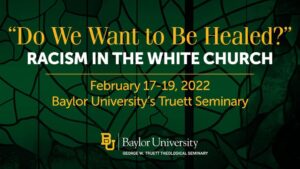 Kristin du Mez will offer a keynote address, “White Evangelicals on Race,” at the Racism in the White Church conference at Baylor this Friday, Feb. 18, at 4 p.m. Central time, and engage in conversation with Beth Barr earlier in the day at 2:30 p.m. Register for the conference (live or online) here.
Kristin du Mez will offer a keynote address, “White Evangelicals on Race,” at the Racism in the White Church conference at Baylor this Friday, Feb. 18, at 4 p.m. Central time, and engage in conversation with Beth Barr earlier in the day at 2:30 p.m. Register for the conference (live or online) here.
Greg Garrett is an award-winning professor at Baylor University. One of America’s leading voices on religion and culture, he is the author of more than two dozen books, most recently In Conversation: Rowan Williams and Greg Garrett and A Long, Long Way: Hollywood’s Unfinished Journey from Racism to Reconciliation. He is currently administering a research grant on racism from the Eula Mae and John Baugh Foundation and writing a book on racial mythologies for Oxford University Press. Greg is a seminary-trained lay preacher in the Episcopal Church and canon theologian at the American Cathedral of the Holy Trinity in Paris. He lives in Austin with his wife, Jeanie, and their two daughters.
Related articles:
Jesus and John Wayne exposes militant masculinity in the age of Trump | Analysis by Alan Bean
I knew the truth about women in the Bible, and I stayed silent | Opinion by Beth Allison Barr
The year of being threatened by smart women | Analysis by Mark Wingfield
BNG column sparks Thanksgiving Twitter war of words between complementarians and two female scholars | Analysis by Rick Pidcock

